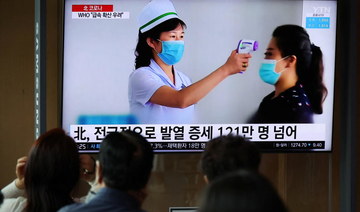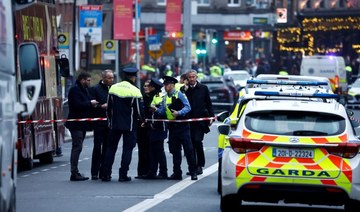SEOUL: North Korea said Wednesday more than a million people have already recovered from suspected COVID-19 just a week after disclosing an outbreak it appears to be trying to manage in isolation as global experts express deep concern about the public health threat.
The country’s anti-virus headquarters announced 232,880 new cases of fever and another six deaths in state media Wednesday. Those figures raise its totals to 62 deaths and more than 1.7 million fever cases since late April. It said at least 691,170 remain in quarantine.
Outside experts believe most of the fevers are COVID-19 but North Korea lacks tests to confirm so many. The outbreak is almost certainly larger than the fever tally, since some virus carriers may not develop fevers or other symptoms.
It’s also unclear how more than a million people recovered so quickly when limited medicine, medical equipment and health facilities exist to treat the country’s impoverished, unvaccinated population of 26 million. Some experts say the North could be simply releasing people from quarantine after their fevers subside.
Globally, COVID-19 has killed about 6.3 million people with the true toll believed to be much higher. Countries with outbreaks of a similar size to North Korea’s official fever tally have confirmed thousands of deaths each.
World Health Organization Director-General Tedros Adhanom Ghebreyesus said Tuesday that North Korea has not responded to its request for more data about its outbreak.
Before acknowledging COVID-19 infections for the first time last week, North Korea had held to a widely doubted claim of keeping out the virus. It also shunned millions of vaccine shots offered by the UN-backed COVAX distribution program, likely because of international monitoring requirements attached to them.
North Korea and Eritrea are the only sovereign UN-member countries not to have rolled out vaccines, but Tedros said neither country has responded to WHO’s offers of vaccines, medicines, tests and technical support.
“WHO is deeply concerned at the risk of further spread in (North Korea),” Tedros said, also noting the country has worrying numbers of people with underlying conditions that make them more likely to get severe COVID-19.
WHO emergencies chief Dr. Michael Ryan said unchecked transmission of the virus could lead to new variants but that WHO was powerless to act unless countries accepted its help.
The North has so far ignored rival South Korea’s offer to provide vaccines, medicine and health personnel, but experts say the North may be more willing to accept help from its main ally China. South Korea’s government said it couldn’t confirm media reports that North Korea flew multiple planes to bring back emergency supplies from China on Tuesday.
North Korean officials during a ruling party Politburo meeting Tuesday continued to express confidence that the country could overcome the crisis on its own, with the Politburo members discussing ways for “continuously maintaining the good chance in the overall epidemic prevention front,” the official Korean Central News Agency said Wednesday.
There’s suspicion that North Korea is underreporting deaths to soften the blow for Kim, who already was navigating the toughest moment of his decade in power. The pandemic has further damaged an economy already broken by mismanagement and US-led sanctions over Kim’s nuclear weapons and missiles development.
At the Politburo meeting, Kim criticized officials over their early pandemic response, which he said underscored “immaturity in the state capacity for coping with the crisis” and he blamed the country’s vulnerability on their “non-positive attitude, slackness and non-activity,” KCNA said.
He urged officials to strengthen virus controls at workplaces and redouble efforts to improve the supply of daily necessities and stabilize living conditions, the report said.
North Korea has also deployed nearly 3,000 military medical officers to help deliver medicine to pharmacies and deployed public health officials, teachers and students studying health care to identify people with fevers so they could be quarantined. The country has been relying on finding people with symptoms and isolating them at shelters since it lacks vaccines, high-tech medicine and equipment, and intensive care units that lowered hospitalizations and deaths in other nations.
While raising alarm over the outbreak, Kim has also stressed that his economic goals should be met. State media reports show large groups of workers are continuing to gather at farms, mining facilities, power stations and construction sites, being driven to ensure their works are “propelled as scheduled.”
North Korea’s COVID-19 outbreak came amid a provocative run in weapons demonstrations, including its first test of an intercontinental ballistic missile in nearly five years, in a brinkmanship aimed at forcing the United States to accept the idea of the North as a nuclear power and negotiate economic and security concessions from a position of strength.
US and South Korean officials also believe North Korea could conduct its seventh nuclear test explosion this month.
The North Korean nuclear threat is expected to top agenda when US President Joe Biden meets South Korean President Yoon Suk Yeol during a visit to Seoul this week. Kim Tae-hyo, Yoon’s deputy national security adviser, told reporters Wednesday that North Korea probably won’t conduct a nuclear test this week but that its preparations for another ICBM test appeared imminent.
Kim Jong Un during Tuesday’s Politburo meeting affirmed he would “arouse the whole party like (an) active volcano once again under the state emergency situation” to prove its leadership before history and time and “defend the wellbeing of the country and the people without fail and demonstrate to the whole world the strength and the spirit of heroic Korea once again,” KCNA said. The report did not make a direct reference to a major weapons test.
Recent commercial satellite images of the nuclear testing ground in Punggye-ri indicate refurbishment work and preparations at a yet unused tunnel on the southern part of the site, which is presumably nearing completion to host a nuclear test, according to an analysis released Tuesday by Beyond Parallel, a website run by the Washington-based Center for Strategic and International Studies.
North Korea hails COVID-19 recovery as WHO worries over missing data
https://arab.news/r3sz7
North Korea hails COVID-19 recovery as WHO worries over missing data
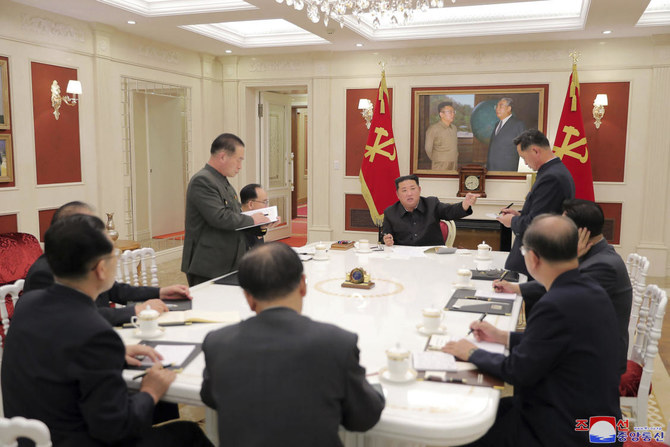
- Country’s anti-virus headquarters announced 232,880 new cases of fever and another six deaths
- Outside experts believe most of the fevers are COVID-19 but North Korea lacks tests to confirm so many
Netherlands remembers World War Two dead amid tight security due to Gaza war
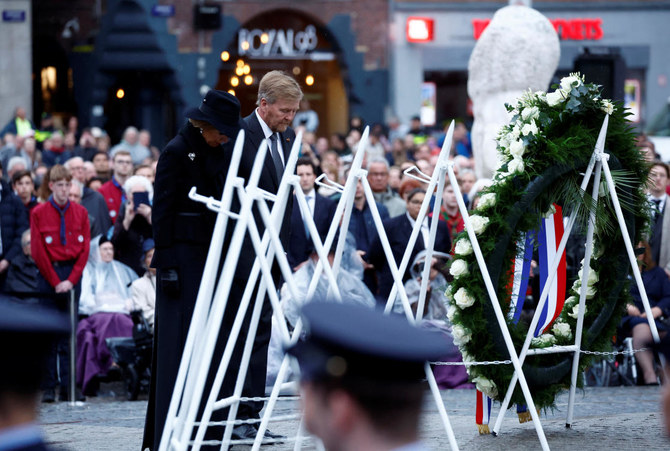
- Normally some 20,000 people attend the Dam commemoration
- Earlier this week municipal authorities announced unprecedented security measures to keep the ceremony safe and avoid possible disruptions linked to the Israel-Hamas war
AMSTERDAM: Dutch King Willem-Alexander and Prime Minister Mark Rutte joined around 4,000 people on Saturday for the country’s annual World War Two remembrance ceremony amid restricted public access and heightened security due to the war in Gaza.
The ceremony on Amsterdam’s central Dam square, with the traditional two minutes of silence at 8 p.m. (1800 GMT) to commemorate the victims of World War Two, passed smoothly despite fears that there might be protests.
Normally some 20,000 people attend the Dam commemoration without having to register. But earlier this week municipal authorities announced unprecedented security measures to keep the ceremony safe and avoid possible disruptions linked to the Israel-Hamas war.
At the opening of a Holocaust Museum in Amsterdam in March, pro-Palestinian protesters opposed to Israel’s military campaign in Gaza set off fireworks and booed Israeli President Isaac Herzog as he arrived on a visit.
Every town and the city in the Netherlands holds its own remembrance ceremony on May 4 and tens of thousands of people attend the events. The Netherlands then marks on May 5 the anniversary of its liberation from Nazi occupation in 1945.
Drone footage shows Ukrainian village battered to ruins as residents flee Russian advance
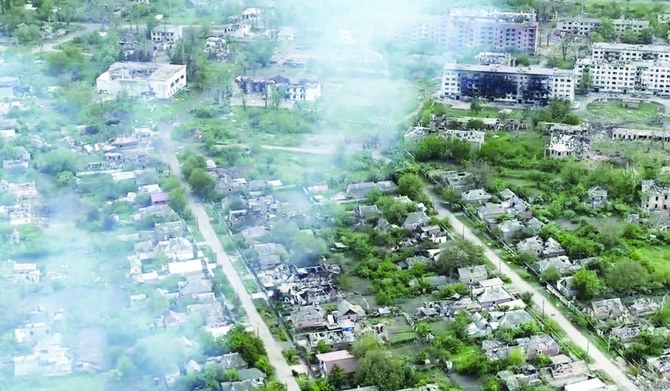
- Residents have scrambled to flee the village, among them a 98-year-old woman who walked almost 10 kilometers (6 miles) alone last week, wearing a pair of slippers and supported by a cane, until she reached Ukrainian front lines
KYIV: The Ukrainian village of Ocheretyne has been battered by fighting, drone footage obtained by The Associated Press shows. The village has been a target for Russian forces in the Donetsk region of eastern Ukraine.
Russian troops have been advancing in the area, pounding Kyiv’s depleted, ammunition-deprived forces with artillery, drones and bombs. Ukraine’s military has acknowledged the Russians have gained a “foothold” in Ocheretyne, which had a population of about 3,000 before the war, but says that fighting continues.
Residents have scrambled to flee the village, among them a 98-year-old woman who walked almost 10 kilometers (6 miles) alone last week, wearing a pair of slippers and supported by a cane, until she reached Ukrainian front lines.
FASTFACT
Ukraine’s military has acknowledged the Russians have gained a “foothold” in Ocheretyne, which had a population of about 3,000 before the war, but says that fighting continues.
Not a single person is seen in the footage, and no building in Ocheretyne appears to have been left untouched by the fighting. Most houses, apartment blocks and other buildings look damaged beyond repair, and many houses have been pummeled into piles of wood and bricks. A factory on the outskirts has also been badly damaged.
The footage also shows smoke billowing from several houses, and fires burning in at least two buildings.
Elsewhere, Russia has in recent weeks stepped up attacks on Kharkiv, Ukraine’s second-largest city, in an attempt to pummel the region’s energy infrastructure and terrorize its 1.3 million residents.
Four people were wounded and a two-story civilian building was damaged and set ablaze overnight after Russian forces struck Kharkiv, in northeastern Ukraine, with exploding drones, regional governor Oleh Syniehubov said Saturday.
The four, including a 13-year-old, were hurt by falling debris, he said on the Telegram messaging app.
Russian state agency RIA reported Saturday reported that Moscow’s forces struck a drone warehouse in Kharkiv that had been used by Ukrainian troops overnight, citing Sergei Lebedev, described as a coordinator of local pro-Moscow guerrillas. His comments could not be independently verified.
Syniehubov said Russia also bombed Kharkiv on Friday, damaging residential buildings and sparking a fire. An 82-year-old woman died and two men were wounded.
Ukraine’s military said Russia launched a total of 13 Shahed drones at the Kharkiv and Dnipropetrovsk regions of eastern Ukraine overnight, all of which were shot down by Ukrainian air defenses.
Students in Ireland, Switzerland join the protest wave over Gaza
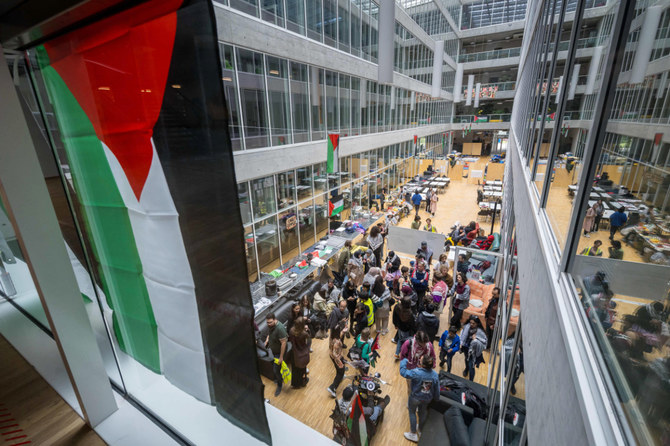
- Dublin students build encampment, forcing university to restrict campus access and close Book of Kells exhibition
- Israel has killed more than 34,000 Palestinians in Gaza, mostly women and children, according to the health ministry in the Hamas-run territory
DUBLIN: Students at Trinity College Dublin and Lausanne University in Switzerland have staged occupations to protest against Israel’s war in Gaza, joining a wave of demonstrations sweeping US campuses.
In Dublin, students built an encampment on Friday, forcing the university to restrict campus access on Saturday and close the Book of Kells exhibition, one of Ireland’s top tourist attractions.
The camp was set up after the students’ union said the university had fined it €214,000 ($230,000) for losses caused by protests in recent months, not exclusively over Gaza.
The protesters were demanding that Trinity cut academic ties with Israel and divest from companies with ties to Israel.
BACKGROUND
The protesters were demanding that Trinity College Dublin cut academic ties with Israel and divest from companies with ties to Israel.
Students’ union president Laszlo Molnarfia posted a photograph of benches piled up at the entrance to the building housing the Book of Kells, an illuminated manuscript created by Celtic monks in about 800 AD.
Trinity College said it had restricted access to students, staff, and residents to ensure safety and that the exhibition would be closed on Saturday.
More than 34,600 Palestinians have been killed in Israel’s seven-month-old assault on the Gaza Strip, say health officials in the enclave.
The war began when Hamas militants attacked Israel on Oct. 7.
Pro-Palestinian protests have also been held at universities in Australia and Canada.
In Lausanne, around 100 students occupied a building to back demands, including an end to scientific cooperation with Israel.
“Palestinians have been dying for over 200 days, but we are not being heard,” one protester told Swiss television on Saturday.
“There’s a global movement to get governments to take action, but it’s not happening. That’s why we want to get universities involved now.”
The university said the occupation could continue until Monday, provided it did not disrupt work on campus.
“We universities are not called upon to take political stands,” the university’s rector, Frederic Herman, told RTS radio.
Last week, the head of Trinity College, Linda Doyle, said it was reviewing its investments but that it was for individual academics to decide whether to work with Israeli institutions.
Sadiq Khan, Pakistani immigrant bus driver’s son, makes history by winning third term as London mayor
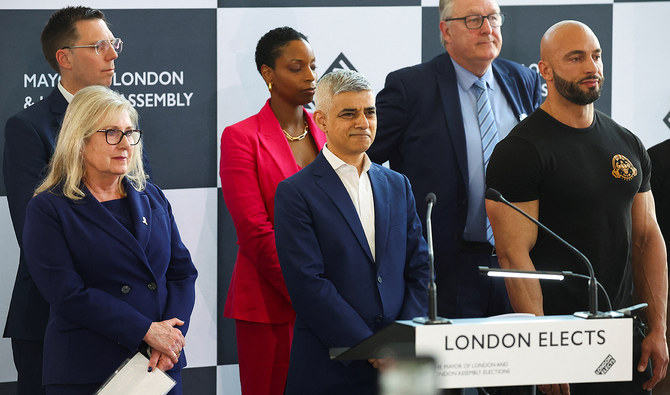
- Khan, an official with global renown, became the first Muslim mayor of a Western capital when elected in 2016
- Born in London in 1970, he grew up in public housing the Tooting area and slept in a bunk-bed until he was 24
LONDON: Sadiq Khan, who was Saturday re-elected for a record third term as London mayor, rose from humble roots to spar with world leaders and bring consequential change to the British capital.
The 53-year-old Labor party politician – a former human rights lawyer brought up on a London public housing complex – comfortably defeated Conservative rival Susan Hall for a third stint at City Hall.
He now overtakes predecessor Boris Johnson as the longest-serving holder of the post, which notably has powers over the emergency services, transport and planning in the city of nearly nine million.
Victory continues a remarkable journey for the Pakistani immigrant bus driver’s son, who became the first Muslim mayor of a Western capital when initially elected in 2016.
As mayor, he has made a name for himself as a vocal critic of Brexit and successive Conservative prime ministers, including Johnson, as well as for a feud with former US president Donald Trump.
The pair became embroiled in an extraordinary war of words after Khan criticized Trump’s travel ban on people from certain Muslim countries.
Trump then accused Khan of doing a “very bad job on terrorism” and called him a “stone cold loser” and a “national disgrace.”
The mayor in turn allowed an infamous blimp of Trump dressed as a baby in a nappy to fly above protests in Parliament Square during his 2018 visit to Britain.
“He once called me a stone cold loser. Only one of us is a loser, and it’s not me,” Khan told AFP during his 2021 campaign.
But Khan’s own tenure has not been without its controversies, particularly over last year’s expansion of an Ultra-Low Emission Zone into the largest pollution-charging scheme in the world.
The daily toll on the most-polluting vehicles prompted a fierce backlash in outer boroughs of Greater London, with anger at the extra financial burden during a cost-of-living crisis.
Khan has also been criticized for failing to get to grips with high levels of knife crime and since last year, his handling of large weekly pro-Palestinian protests.
Born in London in 1970 to parents who had recently arrived from Pakistan, Khan was the fifth child out of seven brothers and one sister.
He grew up in public housing in Tooting, an ethnically mixed residential area in south London, and slept in a bunk-bed until he was 24.
His modest background plays well in a city that is proud of its diversity and loves a self-made success story.
Khan still regularly recalls how his father drove one of London’s famous red buses, and his mother was a seamstress.
He is a handy boxer, having learnt the sport to defend himself in the streets against those who hurled racist abuse at him, and two of his brothers are boxing coaches.
He initially wanted to become a dentist, but a teacher spotted his gift for verbal sparring and directed him toward law.
He gained a law degree from the University of North London and started out as a trainee lawyer in 1994 at the Christian Fisher legal firm, where he was eventually made a partner.
He specialized in human rights, and spent three years chairing the civil liberties campaign group Liberty.
He represented Louis Farrakhan, leader of the Nation of Islam movement, and Babar Ahmad, a mosque acquaintance who was jailed in the United States after admitting providing support to the Taliban regime in Afghanistan.
Khan joined Labor aged 15 when Conservative prime minister Margaret Thatcher was in her pomp.
He became a local councilor for Tooting in the Conservative-dominated Wandsworth local borough in 1994, and its member of parliament in 2005.
He still lives in the area with his lawyer wife Saadiya and their two teenage daughters.
Labor prime minister Gordon Brown made him communities minister in 2008 and he later served as transport minister, becoming the first Muslim minister to attend Cabinet meetings.
In parliament, he voted for gay marriage – which earned him death threats.
As mayor, he vowed to focus on providing affordable homes for Londoners and freezing transport fares, but – like many in power around the world – saw his agenda engulfed by the pandemic.
He is London’s third mayor after Labor’s Ken Livingstone (2000-2008) and Johnson (2008-2016), with widespread speculation he could eventually try to follow in his predecessor and become prime minister.
London mayor Khan wins historic third term as Tories routed in local polls

- Khan, 53, easily beat Tory challenger Susan Hall to scupper largely forlorn Tory hopes that they could prise the UK capital away from Labour for the first time since 2016
- In the West Midlands, where Tory incumbent Andy Street is bidding for his own third term, votes were reportedly being recounted and too close to call
LONDON: London’s Labour mayor Sadiq Khan on Saturday secured a record third term, dealing the Conservatives another damaging defeat in their worst local election results in recent memory months before an expected general election.
Khan, 53, easily beat Tory challenger Susan Hall to scupper largely forlorn Tory hopes that they could prise the UK capital away from Labour for the first time since 2016.
The first Muslim mayor of a Western capital when first elected then, he had been widely expected to win as Labour surge nationally and the Conservatives suffer in the polls.
In the end, he saw his margin of victory increase compared to the last contest in 2021.
It adds to a dismal set of results for Prime Minister Rishi Sunak, as his Tories finished a humiliating third in local council tallies after losing nearly 500 seats in voting Thursday across England.
With Labour making huge gains, the beleaguered leader’s Conservatives lost crunch mayoral races in Manchester, Liverpool, Yorkshire as well as the capital and elsewhere.
In the West Midlands, where Tory incumbent Andy Street is bidding for his own third term, votes were reportedly being recounted and too close to call.
An unexpected Tory defeat there could leave Sunak with only one notable success: its mayor winning a third term in Tees Valley, northeast England — albeit with a vastly reduced majority.
Writing in Saturday’s Daily Telegraph, Sunak conceded “voters are frustrated” but insisted “Labour is not winning in places they admit they need for a majority.”
“We Conservatives have everything to fight for,” Sunak argued.
Labour, out of power since 2010 and trounced by Boris Johnson’s Conservatives at the last general election in 2019, also emphatically snatched a parliamentary seat from the Conservatives.
It seized on winning the Blackpool South constituency and other successes to demand a national vote.
“Let’s turn the page on decline and usher in national renewal with Labour,” party leader Keir Starmer told supporters Saturday in the East Midlands, where the party won the mayoral race.
Sunak must order a general election be held by January 28 next year at the latest, and has said he is planning on a poll in the second half of 2024.
Labour has enjoyed double-digit poll leads for all of Sunak’s 18 months in charge, as previous Tory scandals, a cost-of-living crisis and various other issues dent the ruling party’s standing.
On Thursday, they were defending nearly 1,000 council seats, many secured in 2021 when they led nationwide polls before the implosion of Johnson’s premiership and his successor Liz Truss’s disastrous 49-day tenure.
With almost all those results in by Saturday afternoon, they had lost close to half and finished third behind the smaller centrist opposition Liberal Democrats.
If replicated in a nationwide contest, the tallies suggested Labour would win 34 percent of the vote, with the Tories trailing by nine points, according to the BBC.
Sky News’ projection for a general election using the results predicted Labour will be the largest party but short of an overall majority.
Its by-election scalp in Blackpool — on a mammoth 26-percent swing — was the Conservatives’ 11th such loss in this parliament, the most by any government since the late 1960s.
Speculation has been rife in Westminster that restive Tory lawmakers could use the dire local election results to try to replace him. But that prospect seems to have failed to materialize.
However, it was not all good news for Labour.
The party lost control of one local authority, and suffered some councillor losses to independents elsewhere, due to what analysts said was its stance on the Israel-Hamas war.
Polling expert John Curtice assessed there were concerning signs for the opposition.
“These were more elections in which the impetus to defeat the Conservatives was greater than the level of enthusiasm for Labour,” he noted in the i newspaper.
“Electorally, it is still far from clear that Sir Keir Starmer is the heir to (Tony) Blair.”



